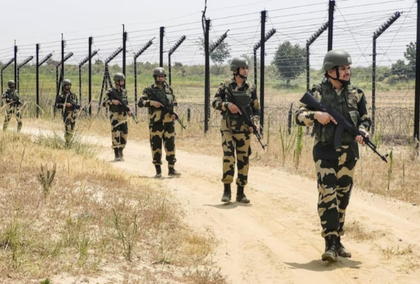Tripura to set up district-level Task Forces to detect, deport infiltrators: Officials
By IANS | Updated: July 19, 2025 14:34 IST2025-07-19T14:29:26+5:302025-07-19T14:34:24+5:30
Agartala, July 19 The Tripura government would constitute task forces in all the eight districts of the state ...

Tripura to set up district-level Task Forces to detect, deport infiltrators: Officials
Agartala, July 19 The Tripura government would constitute task forces in all the eight districts of the state to detect and deport infiltrators staying in the bordering state, officials said here on Saturday.
A senior police official said that the 'Task Force' has already been constituted in West Tripura district, and it is being constituted in the remaining seven districts.
"A senior police official of the district would be the head of the Task Force, and officers-in-charge of various police stations of the concerned district would be the members," the official told IANS, refusing to be named.
The Tripura government's actions followed the Union Ministry of Home Affairs's circular, directing all states and Union Territories across the country to verify the credentials of persons suspected to be illegal immigrants from Bangladesh and Myanmar. If the documents of the foreign citizens are found to be fake or illegally procured, they would face deportation, the MHA circular had said.
Meanwhile, the ruling BJP ally Tipra Motha Party (TMP) has been organising different types of agitation for the past two months, demanding the push-back of "illegal migrants" from Bangladesh and Myanmar.
The tribal past party has demanded strict implementation of the orders from the MHA concerning the identification, detention, and deportation of illegal migrants.
TMP senior leader and party’s legislator Ranjit Debbarma noted that the BJP-ruled states like Assam and Gujarat had taken firm steps against infiltrators, but the Tripura government had not taken adequate steps in this regard.
TMP supremo Pradyot Bikram Manikya Debbarma earlier said that infiltrators would jeopardise the socio-economic and customary aspects of the state's indigenous people, especially the tribals.
"The Government should take stringent steps to prevent the infiltrators from entering India. Those already illegally staying in Tripura and other states must be pushed back immediately," the TMP chief had told IANS.
The party's senior leader and Forest and Environment Minister Animesh Debbama had said that no infiltrators would be allowed to stay in Tripura.
Debbama said that a nine-member delegation of the party led by Pradyot Bikram Manikya Debbarma would meet the Election Commission of India next week to raise several key issues related to the electoral roll preparation in Tripura.
"A major demand would be for a Special Intensive Revision (SIR) of the electoral roll in Tripura, similar to the process recently carried out in Bihar to identify the fake voters and infiltrators," Animesh Debbama told IANS.
Chief Minister Manik Saha earlier said that infiltrators from Bangladesh also realised that Tripura is not a safe zone for them, adding that all security agencies are on a high alert to prevent infiltrators from entering India.
"After the trouble began in Bangladesh last year, security forces maintained a close vigil along the border to foil any kind of infiltration bid," CM Saha, who also holds the Home portfolio, had told the media.
The Chief Minister recently held meetings with the senior security officials of different agencies, including BSF, and requested the officials in the state to maintain close coordination among them to deal with the border-related issues.
Tripura, which has an 856 km border with Bangladesh, is surrounded on three sides by the neighbouring country, making the northeastern state very vulnerable and sensitive to cross-border migration issues and other crimes.
Except for some patches, most of the frontier had been fenced to prevent smuggling, trans-border crimes, and cross-border illegal movements by infiltrators and inimical elements.
Disclaimer: This post has been auto-published from an agency feed without any modifications to the text and has not been reviewed by an editor
Open in app